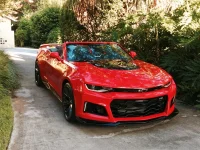salcirabisi
Hasn't posted much yet...
- Joined
- Nov 17, 2015
- Messages
- 40
- Reaction score
- 4
- Points
- 8
- Location
- Panama City
- Genesis Model Type
- Equus (2011-2016)
My wife and I own a home in Florida. We do the snowbird "thing" to rest and relax. Now granted, my wife's concept of "snowbird" is to go to Florida in the teeth of summer, but she explains that we, being a members of an aging populace, need to consider the length of days so we are not driving in the evening (all the while I'm thinking about the 99% humidity and how much the heat will make our visit slightly uncomfortable) since our eyesight presents challenges once the sun sets. Okay fine love!
But, as we are cruising I-65 north on our return trip to Indy I have the cruise control locked at 75 mph and averaging 27.8 mpg. Not bad I think to myself. We stop for a fill up and change of driver and my wife averages 30.4 mpg the rest of the trip. She doesn't use cruise control because as she states, "I want control" of the speed, even though she is always surprised by how well the smart cruise control works when I'm using it. All the while she's cruising at a pretty good clip herself.
Now the explanation is probably obvious and I really don't want to hear it but, it does drive me crazy that she can do that and I'm unable (and maybe unwilling?) or maybe incapable of accomplishing this masterful management of fuel consumption.
Perplexed in Indy!
But, as we are cruising I-65 north on our return trip to Indy I have the cruise control locked at 75 mph and averaging 27.8 mpg. Not bad I think to myself. We stop for a fill up and change of driver and my wife averages 30.4 mpg the rest of the trip. She doesn't use cruise control because as she states, "I want control" of the speed, even though she is always surprised by how well the smart cruise control works when I'm using it. All the while she's cruising at a pretty good clip herself.
Now the explanation is probably obvious and I really don't want to hear it but, it does drive me crazy that she can do that and I'm unable (and maybe unwilling?) or maybe incapable of accomplishing this masterful management of fuel consumption.
Perplexed in Indy!









